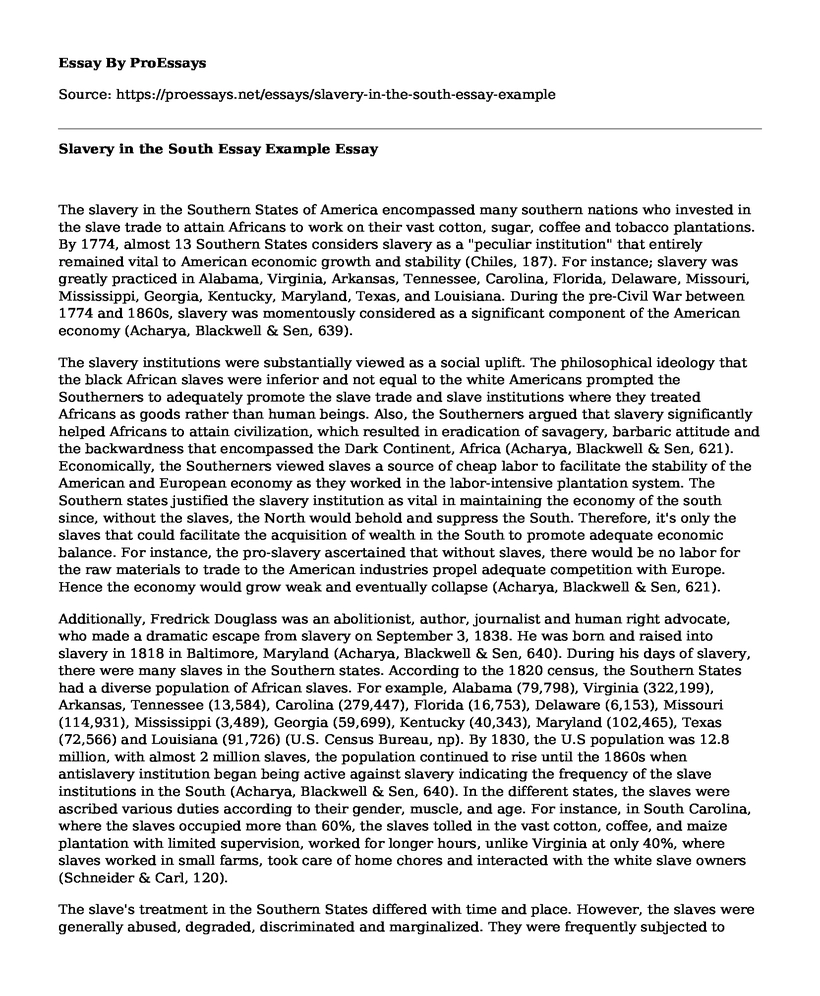The slavery in the Southern States of America encompassed many southern nations who invested in the slave trade to attain Africans to work on their vast cotton, sugar, coffee and tobacco plantations. By 1774, almost 13 Southern States considers slavery as a "peculiar institution" that entirely remained vital to American economic growth and stability (Chiles, 187). For instance; slavery was greatly practiced in Alabama, Virginia, Arkansas, Tennessee, Carolina, Florida, Delaware, Missouri, Mississippi, Georgia, Kentucky, Maryland, Texas, and Louisiana. During the pre-Civil War between 1774 and 1860s, slavery was momentously considered as a significant component of the American economy (Acharya, Blackwell & Sen, 639).
The slavery institutions were substantially viewed as a social uplift. The philosophical ideology that the black African slaves were inferior and not equal to the white Americans prompted the Southerners to adequately promote the slave trade and slave institutions where they treated Africans as goods rather than human beings. Also, the Southerners argued that slavery significantly helped Africans to attain civilization, which resulted in eradication of savagery, barbaric attitude and the backwardness that encompassed the Dark Continent, Africa (Acharya, Blackwell & Sen, 621). Economically, the Southerners viewed slaves a source of cheap labor to facilitate the stability of the American and European economy as they worked in the labor-intensive plantation system. The Southern states justified the slavery institution as vital in maintaining the economy of the south since, without the slaves, the North would behold and suppress the South. Therefore, it's only the slaves that could facilitate the acquisition of wealth in the South to promote adequate economic balance. For instance, the pro-slavery ascertained that without slaves, there would be no labor for the raw materials to trade to the American industries propel adequate competition with Europe. Hence the economy would grow weak and eventually collapse (Acharya, Blackwell & Sen, 621).
Additionally, Fredrick Douglass was an abolitionist, author, journalist and human right advocate, who made a dramatic escape from slavery on September 3, 1838. He was born and raised into slavery in 1818 in Baltimore, Maryland (Acharya, Blackwell & Sen, 640). During his days of slavery, there were many slaves in the Southern states. According to the 1820 census, the Southern States had a diverse population of African slaves. For example, Alabama (79,798), Virginia (322,199), Arkansas, Tennessee (13,584), Carolina (279,447), Florida (16,753), Delaware (6,153), Missouri (114,931), Mississippi (3,489), Georgia (59,699), Kentucky (40,343), Maryland (102,465), Texas (72,566) and Louisiana (91,726) (U.S. Census Bureau, np). By 1830, the U.S population was 12.8 million, with almost 2 million slaves, the population continued to rise until the 1860s when antislavery institution began being active against slavery indicating the frequency of the slave institutions in the South (Acharya, Blackwell & Sen, 640). In the different states, the slaves were ascribed various duties according to their gender, muscle, and age. For instance, in South Carolina, where the slaves occupied more than 60%, the slaves tolled in the vast cotton, coffee, and maize plantation with limited supervision, worked for longer hours, unlike Virginia at only 40%, where slaves worked in small farms, took care of home chores and interacted with the white slave owners (Schneider & Carl, 120).
The slave's treatment in the Southern States differed with time and place. However, the slaves were generally abused, degraded, discriminated and marginalized. They were frequently subjected to harsh and unhygienic working condition and social injustice like rape and severe whipping. In states like South Carolina, severely punished though whipping, mutilation, beatings, and imprisonment (Schneider & Carl, 49). The disobedient slaves were mercilessly killed to prevent others from aggressiveness or disobedience. In Alabama, Florida, Delaware, and Missouri, slaves were prohibited from engaging in social activities like going to church or engaging in equal sexual relation with white America, which frequently led to rape. However, in Virginia, the slaves were allowed to establish churches like the First Church of Coloured Baptists constructed in 1725 (Schneider & Carl, 49). In 1740, Maryland reduced the slave's working hours to 15 in summer and 14 in winter. While other states like Virginia and North Carolina prohibited education and punished education seekers, Kentucky, Missouri, and Utah promoted education of the slave. Nevertheless, despite the strict rules, more than 100,000 slaves managed to escape slavery through the underground railroads with majority escaping from Kentucky, Maryland, and Virginia, which had many slaves (Acharya, Blackwell & Sen, 633). After the enactment of various policies such as the Confiscation Acts and the Emancipation Proclamation of 1863 help in reduction of limiting slavery while the in 1865, through the ratification of the Thirteenth Amendment, the slave officially and legally ended in the United States (Acharya, Blackwell & Sen, 641).
Works Cited
Acharya, Avidit, Matthew Blackwell, and Maya Sen. "The political legacy of American slavery." The Journal of Politics78.3 (2016): 621-641.
Chiles, Katy L. "The Press and Slavery in America, 1791-1859: The Melancholy Effect of Popular Excitement." (2017): 186-187.
Schneider, Dorothy, and Carl J. Schneider. Slavery in America. Infobase Publishing, 2014.
U.S. Census Bureau.The population of the 100 Largest Cities and Other Urban Places in the United States: 1790 to 1990, U.S. Census Bureau, 1998
Cite this page
Slavery in the South Essay Example. (2022, Oct 20). Retrieved from https://proessays.net/essays/slavery-in-the-south-essay-example
If you are the original author of this essay and no longer wish to have it published on the ProEssays website, please click below to request its removal:
- Essay on St. Francis of Assisi, Founder of the Franciscan Order
- The Civil War - Research Paper
- Clausewitz on War and Politics Essay Example
- Essay Example on Artists in War: Pictorial Records, Patriotism & Unity
- Essay on Cold War & Rocky Films: U.S Propaganda Through Cinema
- Essay Example on 9/11: Tragedy, Loss, & Lasting Impact
- Essay Example on Israel-Palestine Conflict: A Century-Old Dispute Over Land







